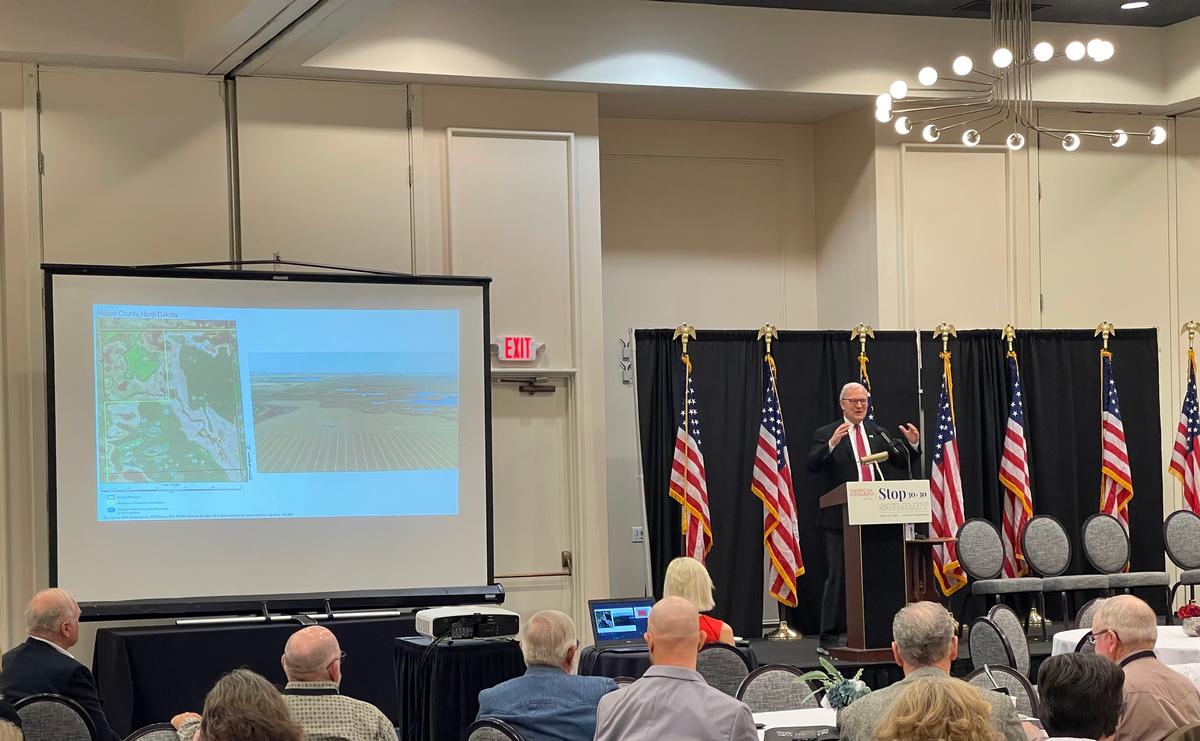Source: United States Senator Kevin Cramer (R-ND)
LINCOLN – U.S. Senator Kevin Cramer (R-ND), member of the Senate Environment and Public Works (EPW) Committee, delivered remarks at the American Stewards of Liberty “Stop 30×30 Summit” in Lincoln, Nebraska. The summit discussed energy-related implications, conservation easements, and the agricultural impact of the Biden Administration’s 30×30 agenda.
“On the first week of his administration, President Biden announced his intention to undermine private property rights, restrict landowners’ ability to control their own lands, and prioritize environmental nongovernmental organizations over hardworking American producers of energy and agricultural commodities,” said Senator Cramer.
The Biden Administration’s 30×30 agenda aims to conserve at least 30% of U.S. lands and waters by 2030. According to the White House, 12% of the nation’s lands are permanently protected and about 23% of its oceans which indicates hundreds of millions of acres would need to be newly protected under the 2030 goal.
“The 30×30 initiative is an extension of the top-down, central planning vision Washington bureaucrats hiding in federal agencies possess. DC bureaucrats believe they know what is best for rural America, all while they live in a concrete swamp completely detached from the producers who feed, fuel, and clothe our nation and the world,” continued Senator Cramer.
Senator Cramer pointed to North Dakota’s longstanding issues with the U.S. Fish and Wildlife Service’s (FWS) Waterfowl Production Area (WPA) easements with farmers, ranchers, and landowners as a warning.
“Let North Dakota be an example to everyone here on what to expect from 30×30. During a downturn in the farm economy, when landowners were just trying to stay in business until the next year, predatory entities like the FWS came to North Dakota and offered Waterfowl Production Area easement contracts with vague details and empty promises. Their goal was simple, pull the wool over the eyes of vulnerable landowners in order to expand their influence and prioritize ducks over people. Years later, landowners sometimes 3 or 4 owners removed from the original landowner who signed the contract are unable to improve their land, produce a crop, and their property values are decreased because of the FWS predatory peddling of WPA perpetual easements. The government tells you these easements are voluntary, I call them predatory,” warned Senator Cramer.
During his remarks, Senator Cramer also discussed “Waters of the U.S.” and referenced three pieces of legislation he introduced to increase transparency surrounding federal land inventory, protect private property rights, and provide a much-needed check on the Biden Administration’s overreaching agenda: the Federal Land Asset Inventory Reform (FLAIR) Act, the 30×30 Termination Act, and the Landowner Easement Rights Act.
The FLAIR Act creates a single database for lands owned by the federal government. The bill would improve the management of federal lands and access to them by eliminating discrepancies between federal departments and increasing transparency through the creation of a searchable system available to the public.
The 30×30 Termination Act blocks the Biden Administration’s directive to conserve at least 30% of the nation’s private lands and waters by 2030.
The Landowner Easement Rights Act prohibits FWS from entering into a conservation easement with a term of more than 50 years. It also gives owners of existing easements the option to renegotiate, renew, or buy out the easement.
Background:
In response to the Biden Administration’s 30×30 land conservation plan released in May 2021, Senator Cramer issued the following statement: “Conserving 30 percent of the nation’s lands and waters is an arbitrary goal which could threaten people’s private property rights and local control over land. North Dakotans have experienced enough attempted land grabs by the federal government already, and they understand conservation goals are best set by the local communities impacted by them, not by bureaucrats in Washington. The last thing they need is the federal government increasing its footprint and getting more in their way.”
At an April EPW Committee markup, Senator Cramer expressed enormous frustration with federal resource agencies and shared North Dakotans’ experience with FWS and conservation easements.
“I want to take the opportunity to provide some background on the enormous frustration the people of North Dakota have had with the Fish and Wildlife Service. Put simply, the Fish and Wildlife Service is the textbook example of an intransigent bureaucracy which is more interested in its own self-interests than the interests of the citizens of this country. Frankly, they are more interested in their self-interest than they are in their mission,” said Senator Cramer.
Senator Cramer has long discussed the history of FWS’s heavy-handed enforcement of conservation easements and its impact on North Dakota landowners and producers. A September 2017 townhall hosted by Senator Cramer featured testimony from several North Dakotans upset with federal agents being armed when they came to their property to discuss the easements, a practice which was then walked back by the Trump Administration. In October 2019, then-Interior Secretary David Bernhardt visited the state to hear directly about these issues, which led to FWS releasing a memorandum establishing a template for consistent enforcement and the first-ever appeals process for landowners who never received an easement map.
A subsequent site visit and roundtable in Devils Lake, North Dakota with then-FWS Director Aurelia Skipwith in August 2020 revealed the new appeals process was proving ineffective in making the meaningful changes sought by North Dakotans. Senator Cramer outlined these problems to Assistant Secretary of Fish and Wildlife and Parks, Shannon Estenoz, during her EPW nomination hearing in May 2021. As her first official visit as Assistant Secretary, Estenoz came to North Dakota to hear about these problems firsthand. Senator Cramer voted against the current FWS Director, Martha Williams because the FWS remains intransigent.
There has not been a single substantive change in any appeal under the review of the FWS Director, but the new mapping and appeals process has created a beneficial administrative record for landowners and the state.
